-
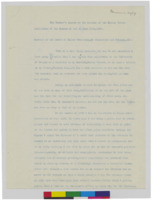
Mrs. Warner's speech at the opening of the Murray Warner Collection of the Museum of Art on June 10th, 1933 (Museum copy)
Transcript:
Museum copy
Mrs Warner’s Speech at the opening of the Murray Warner Collection of the Museum of Art on June 10th,1933.
Members of the Board of Higher Education, Mr Chancellor and Friend, All.
This a very happy occasion for me. We are assembled here today in order that I may present this collection to the University of Oregon as a memorial to my husband, Murray Warner. It is also a tribute to my father, Perkins Bass, who had a wide interest in art and his love for humanity took in everyone who came within his reach, both at home and abroad.
During my childhood we were in Europe for five years and hew was with us much of that time, instilling in us the love of the good and the love for the beautiful, the understanding of which makes the whole world kin. My husband’s interest in art and his love for his fellow man were as deep as that of my father.
In the summer of 1906 I had an experience in Japan which interested me very much. In those days I was doing a great deal of photography and wanted to take pictures of everything. I went with my guide to the famous art museum a Nara and after carefully through the Museum I asked the Director I could take pictures of the status. He looked at me doubtfully and then asked what I wanted to photograph. Due my early training I was able to point out to him the museum’s greatest treasures, making no mistakes and consequently permission to take these pictures was graciously granted, even a step-ladder was provided upon which to place my camera. As I finished, I discovered a beautiful statue twice life size, in a dark corner at my request the Director had it moved to the verando [sic] so that I could photograph it. The pictures taken at this time have been made into colored lantern slides which I greatly prize. When I went to the Director’s office to thank him for his kindness, without any request on my part, he gave me a letter of introduction to the Director of the Museum at Kyoto. Similar courtesies were shown me there, for instance, a large screen as taken into the courtyard, so that I could have sufficient light to photograph it.
In 1929 following the Pacific Relations Conference at Kyoto, I went to see the Imperial Treasure House called the Sho-so-in at Nara. I told the Director about the kindness extended to me years ago at the museums at Kyoto and Nara and from what he said I judged that these earlier courtesies had been extended to me by friends of his, who were grateful for my appreciation of oriental art. He also showed me special courtesies. These experiences taught me that the way to the heart of Japan, which is also the way to the heart of China, is through an understanding and appreciation of their art which they love and treasure.
After my husband passed away I came to Eugene to live, because my son Sam Bass Warner, was teaching here in the University Law School. I found the students not at all internationally minded not at all interested in giving the foreign students a happy time, not at all appreciative because these students had been chosen to come to the United States, to the State of Oregon, and to the University of Oregon, to get their education and form their friendships. So I went to work to see what could be done to change this situation, and to arouse in our students some understanding of the brotherhood of man, all the children of one Father. My mother, Clara Foster Bass, showed me the way. Some years she provided a building in which she established a museum of Colonial art, a museum library for books on New Hampshire, and an auditorium. This is known as the “Historical Building” at Peterborough, New Hampshire, and was established for the purpose of instilling in the hearts of the people of New Hampshire, a love for all that is good in the history of the state.
My first step was to give the University my then small collection of Oriental art, and since then I have made six trips to the Orient to improve and add to the collection. My friend Mrs Seaton, Mrs Potter, and Mrs Perkins have gone with me to the Orient, facing the dangers of a war-ridden country and the siege of Peking, in order that this museum collection might be built up. And above all my son Sam’s deep interest and cooperation, financial and otherwise, have encouraged me every step of the way, and had this not been his attitude, this museum work would never have been undertaken and carried out by me.
It was thru the untiring efforts of Mrs Gerlinger of Portland, President Hall, and Vice-president Barker that the funds were collected for this building which was built to house the Murray Warner Collection. I am most grateful to them, and to those who responded so generously to their appeal, and especially am I grateful to the people of the city of Eugene for their share, and to Dean Lawrence for having the vision to plan such a beautiful building, and to Dr Kerr for his cordial cooperation and encouragement which made the installation of the collection in this building possible, and to the Board of Higher Education for their kindness and generosity.
And now, I hereby present to the University of Oregon, in the State of Oregon, subject to my Deed of Gift, this collection of Oriental art…my hope and prayer is that it will be a great blessing to the University and to the State of Oregon…that it will always be a channel for International friendship and understanding between our students and those of the Orient and that this friendship and understanding will continue unabated throughout their lives.
End of transcript.
Transcribed by Tom Fischer.
-
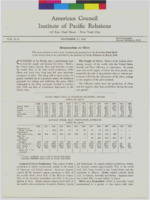
Transcript:
Vol. III-22 of the American Council, Institute of Pacific Relations
American Council Institute of Pacific Relations129 East 52nd Street • New York City
Vol. II-22
November 17, 1933
Issued fortnightly
Annual Subscription $2.00
Memorandum on Silver
This memorandum is taken from a manuscript prepared for the Economic Hand Book of the Pacific Area, to be published by the Institute of Pacific Relations in March, 1934
COUNTRIES of the Pacific play a predominant part in both the supply and demand for silver. Mexico, the United States, Canada, Peru and Australia account for nearly %90 of the total world production, while China and India have long been the most important consumers of silver. The sharp fall in silver prices; its greatly curtailed use as a monetary metal; the numerous proposals for raising and stabilizing the price, which culminated in the silver agreement reached in London, July 1933, are thus of tremendous importance in the Pacific Area.
The Supply of Silver—Mexico is the leading silver mining country of the world with the United States, Canada and Peru following in importance. In recent years the world supply of silver has been greatly augmented by the sale of demonetized coins by various governments following the debasement of the silver coinage or the adoption of the gold standard.
The following tables show the production of silver and the supplies other than production, during the post-war period:
SILVER PRODUCTION IN PRINCIPAL COUNTRIES, 1920-1932
(million fine ounces)
1920
1921
1922
1923
1924
1925
1926
1927
1928
1929
1930
1931
1932
United States
55.4
53.1
56.2
73.3
65.4
66.2
62.7
60.4
50.4
61.2
58.4
32.0
24.7
Mexico
66.7
64.5
81.1
90.9
91.5
92.9
98.3
104.3
108.5
108.7
105.7
109.0
69.3
Canada
12.8
13.1
18.6
17.8
19.7
20.2
22.4
22.7
21.9
23.1
26.2
26.1
18.3
Peru
9.2
10.0
13.2
18.7
18.7
19.9
21.5
18.3
21.6
21.5
--
9.3
6.3
Australasia
2.7
5.4
11.5
13.8
10.8
10.8
11.2
10.3
10.3
10.4
--
9.2
9.7
World
173.3
171.3
207.8
246.0
239.5
245.2
253.8
254.0
257.9
261.7
243.7
196.0
168.7
SUPPLIES OTHER THAN PRODUCTION—ESTIMATES
1920
1921
1922
1923
1924
1925
1926
1927
1928
1929
1930
1931
1932
Debasement of British Coinage
--
--
24.0
25.0
2.0
7.0
0.7
1.2
5.5
10.0
--
--
--
Demonitized European Coins
18.0
31.0
19.0
20.0
18.0
23.0
7.0
8.0
32.0
10.0
22.0
--
--
Sales by Indian Gvt.
--
--
--
--
--
--
--
9.2
22.5
35.0
29.5
47
69
Total Other Supplies
18.0
13.0
43.0
45.0
20.0
7.0
0.7
18.4
60.0
67.0*
71.5†
--
--
New Production
173.3
171.3
207.8
246.0
239.5
245.2
253.8
254.0
257.9
261.7
243.7
196
168
Total Supply
191.3
202.3
252.8
291.0
259.5
252.1
254.5
272.4
317.3
327.9
315.2
251
230
Price, N. Y. (cents per 1 lb. average)
100
2.6
67.5
64.8
66.7
69.0
62.1
56.3
58.1
52.9
38.1
28.7
28.1
*Includes 12,000,000 sound by French Indo-China
†Includes 20,000,000 ounces sold by French Indo-China
Control of Silver Production—The control of silver production is highly concentrated, mainly in the hands of American and British interests. American interests control all the domestic output, amounting to 23% of the world’s total; about 75% of the Mexican output;33% of the Canadian production, and 90% of the production in Peru. British capital controls about 22% of the world’s mine production, located in Mexico, Canada, and Australasia. As regards refinery production, American interests control approximately 73% of the world total, 52% being located in the United States and the remainder in Mexico. British capital controls about 11%, in Canada, Australia and Burma. Japanese interests control 10%, located entirely in Japan.
Silver as a by-product—Silver is invariably found amalgamated to a greater or less degree with other metals, chiefly with lead, zinc, copper and gold. As a result, a large proportion of the world’s silver supply is independent of the silver price of its continued production, as long as the amalgamated metals continue in demand. The United States Bureau of Mines estimates that only about a quarter of the world’s silver production is produced from ores depending on silver for over 80% of the recoverable value. This factor is of great significance in any plan for restricting or regulating silver production and also in estimating the importance of the decline in silver prices to producers in general.
Demand for Silver—In the consumption of silver, purchases by China and British India are by far the most important items. Indian imports are in the form of bullion and jewelry and are intended entirely for the Indian people; the Indian Government having been, since the adoption of the gold standard in 1926, an important seller of silver derived from demonetized coins. Chinese consumption is of a different type. China is on the silver standard and the Chinese Government therefore buys silver regularly for coinage purposes. In 1931 the net imports of these two countries accounted for 45.5.% of the total sold that year.
The second item in the demand for silver is it use in arts and industries, chiefly in the United States, Canada, Great Britain and Germany, and the third is its coinage as a subsidiary metal in Western countries. The following table shows the world movements of silver in 1930 and 1931:
SILVER, THE MARKET, 1930-1931
SUPPLY
1930--Millions of fine ounces
1930--% of total
1931--Millions of fine ounces
1931--% of total
New Production
246.8
77.5
196.1
76.2
Sales by Indian Gvt.
29.5
9.3
35.0
14.1
Other Gvt. Sales of demonetized silver
42.0
13.2
24.5
9.6
TOTAL
318.3
100.0
255.6
100.0
DEMAND
Net Indian Consumption
94.5
29.7
57.0
22.3
Net Chinese Consumption
123.0
38.9
59.0
23.1
TOTAL
217.5
68.6
116.0
45.5
German Consumption
8.0
2.5
28.2
11.0
Arts and Industries, U. S. A. and Canada
29.5
9.3
30.5
11.9
Arts and Industries, Great Britain
6.0
1.9
10.0
3.9
Arts and Industries, Mexico
1.0
.3
1.0
.4
TOTAL ARTS AND INDUSTRIES
36.5
11.5
41.5
16.2
COINAGE
U. S. only
6.1
1.9
2.4
1.0
Hongkong
14.0
4.4
--
--
Otherwise unaccounted for
36.2
11.4
67.5
26.4
TOTAL
318.3
100.0
255.6
100.0
Silver Markets—The silver market is a wide one, including not only trade in bullion, but also the silver-currencies foreign exchange market. The four principal silver markets are Shanghai, Bombay, New York, and London. Most of the world’s mine production passes through New York and San Francisco, a large volume going to London for sale and transshipment to the Orient. Shanghai is the chief receiving port for silver, Bombay being the next in importance. The silver markets are closely interrelated. Chinese buy and sell in New York, London and Bombay. Americans and Mexicans sell in London, Bombay and Shanghai. British Indians trade both way in London, New York and Shanghai. The following table shows the silver shipments from important ports, 1928-1932:
SILVER SHIPMENTS FROM IMPORTANT POINTS
1928
1929
1930
1931
1932
San Francisco
To China
62,637
57,111
45,340
15,719
13,642
To Japan
11
--
--
50
--
To India
--
--
757
577
--
To others
--
--
--
4,491
674
New York
To England
892
151
5,292
11,648
1,574
To Germany
4,269
2,774
2,637
7,719
2,404
To China
36,903
64,102
51,573
20,695
21,479
To India
35,599
16,819
24,554
20,610
652
To others
2,686
248
89
609
440
London to the East
To India
£4,012
£3,948
£5,648
£3,137
£639
To China
2,314
1,160
1,363
872
1,370
To Straits
198
--
12
64
67
Silver Prices—The history of silver in the post-war period has been one of the record prices in 1919 and 1920; a subsequent sharp and continued decline; and a long series of proposals for stabilization of production and raising of prices, mainly sponsored by the silver-producing interests in the United States. The boom in silver during and immediately after the war resulted from the heavy purchases of war materials by European countries in the Orient, necessitating payment in silver; from the constant rising level of commodity prices and industrial activity, and from the pitman Act of 1918 whereby the United States government undertook to purchase, at not less than $1.00 per fine ounce, sufficient American silver to replace that sold to Great Britain and exported to India.
The collapse of silver prices in 1920 was brought about primarily by the financial policies of various governments. In March, 1920, the British government, to prevent illegal melting of silver coins whose intrinsic value had exceeded their face value by 33%, reduced the silver content of subsidiary coins from an original fineness of 0.925 to 0.500. Between 1920 and 1938 thirty-two countries followed suited, eight of which abolished silver coins altogether. The sales from this demonetized silver from 1920 to 1930 amounted to 225,000,000 fine ounces.
In 1926 India adopted the gold standard, and upon the recommendation of the Royal Commission of Indian currency, the government began the sale of a large percentage of its stock of silver. In 1930, French Indo-China also abandoned the silver standard and unloaded heavy supplies of demonitized coins. In February 1931, silver prices reaches an all-time low of 25 ¾ cents per fine ounce. Production was greatly curtailed, but the decline in purchasing power of India and China, resulting from the general economic depression kept consumption far in arrears of supply:—
PRODUCTION AND CONSUMPTION OF SILVER
1929-1932
(millions of fine ounces)
New Production
Other Supplies
Total World Supplies
1929
261
67
328
1930
244
72
316
1931
194
47
251
1932
161
69
230
CONSUMPTION
India
China
Germany
Arts & Manufactures
Coinage
Unaccounted For
1929
82
137
12
44
25
29
1930
95
123
8
36
20
34
1931
57
59
28
42
21
56
1932
12
40
23
31
48
54
AVERAGE PRICE—PER FINE OUNCE
London Spot
New York official
1929
24.5d
52.9 cents
1930
17.6
38.2 “
1931
14.6
28.7 “
1932
17.8
27.9 “
Efforts at Regulation of Silver Prices—There are two schools of thought regarding the desirability, means and results of raising silver prices. The silver producing interests hold that the decreased use of silver has brought about the collapse in price which in turn has caused an unprecedented shrinkage in international trade, and is an important factor in the under-consumption of commodities since it has reduced the purchasing power of virtually the entire Orient. A notable exponent of this school is Senator Key Pitman of Nevada who has been indefatigable in introducing silver into wider use as currency, and in stressing the importance of higher prices for silver as a stimulus to United States trade with the Far East and Mexico.
On the other hand, many economists hold that the decline in the price of silver is the direct consequence of the general economic depression and of its effect upon the gold value of the exports from Oriental countries. The amount of silver which India and China can buy depends on the buying power of their exports and the decline in silver prices is a result, rather than a cause of the decreased volume of Oriental trade. According to this line of thought, a rise in the gold price of silver, without a corresponding rise in the prices of Oriental export goods, would encourage imports into the silver-using countries, diminish their exports, and necessitate an increased export of silver to balance their international payments, causing a further upsetting of the silver market. An economically sound advance in the world price of silver, therefore, is contingent solely upon an increased demand for silver on the part of Far Eastern countries, which can only arise when China and India can sell their products in greater volume and at higher prices in the world markets.
Repeated demands on the part of silver producing countries for international action to raise silver prices led to the forming of a sub-committee on silver to report to Committee on Monetary Stabilization of the World Economic Conference in London. A provisional agreement was drawn up and signed on July 22nd by delegates from India, China, and Spain as the most important holders of silver, and from Australia, Canada, the United States, Mexico and Peru as the principal producers.
The main provisions are as follows:
For a four year period beginning in January, 1934:
1. The Indian Government will not sell more than 140 million ounces—an average of 35 million per year.
2. The Spanish government will not sell more than 20 million ounces.
3. The Chinese government will not sell silver from demonetized coins.
4. The government of the producing countries agree to buy or otherwise withdraw from the market a total of 35 million ounces per year. This amount has been apportioned as follows:
United States
24,421,410 ounces
69.78%
Mexico
7,159,108 “
20.45%
Canada
1,671,802 “
4.78%
Peru
1,095,325 “
3.13%
Australia
652,355 “
1.86%
The chief beneficiary of the agreement, apparently, will be the British Empire. Canada and Australia have agreed to absorb less than 7% of the 35 million ounces, although British capital controls nearly 22% of the world output. The government of India, while agreeing not to increase its sales beyond the previous maximum in any one year, retains its right to continue sales to governments desiring to pay their American war debts with silver. Under the Agricultural Adjustment act of May 12, 1933, the President of the United States was authorized to receive payment of these debts up to $200,000,000 at an arbitrary value of 50 cents an ounce. In making its war debt payment, June 15, 1933, the British government purchased 20 million ounces of silver in India at a cost of a little more than $7,000,000, and with this obtained a credit of $10,000,000 at the United States Treasury.
The time limit for ratification of the silver agreement is April 1, 1934; it is being stipulated that if any of the silver-producing countries withhold their consent, it will still become effective if those which ratify it make arrangements to buy or withdraw from the market a full allotment of 35,00,00 ounces.
Sources:
H.M. Bratter, The Silver Market, U. S. Bureau of Foreign and Domestic Commerce, 1932. And also
Silver—Some Fundamentals, Journal of Political Economy, June, 1931.
The Congressional Record.
The Economist, London; and Finance and Commerce, Shanghai.
News Items in the British, Chinese and American Press.
The American Bureau of Metal Statistics, Year Book, 1932.
W. P. Rawles, The Nationality of Commercial Control of the World Minerals, New York, 1933.
I. P. R. MEMORANDA
VOLUME II—1933
Coal in Japan and Manchuria
Import Trade with the Philippine Islands
Chinese Government Finances
Japanese Mandated islands in the Pacific
The Chinese Boycott
The Far East on the America Screen
Construction in China
Chinese Eastern Turkestan
International Cooperation in China’s Public Health
Basic English as an Aid to Language in the Pacific
Effects on Japan of Depreciation of the Yen
Depreciation of the Yen: Effect on Japan’s Foreign Trade
United States Investments in Japan
Sugar
Railway Construction in Manchuria
Tin
Anglo-Indian-Japanese Textile Competition
Japanese Rice Control
Wheat
Government Subsidies in Pacific Shipping
Some Notes on the Study of China and Japan in American Schools
10 CENTS A COPY
$2.00 A YEAR
End of transcript.
Transcribed by Tom Fischer.
-
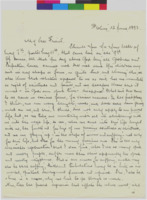
Correspondence between Gertrude Bass Warner and General Normann Munthe
Transcript:
Peking, 12 June, 1933.
My dear Friend,
Thank you for your letter of May 7th, posted May 11th, that came here on the 9th. Of course, all that you say about God being all Goodness and Perfection, hence cannot and does not send his His children any evil in any shape or form, is quite true, and knowing this, we also know that whatever appears to us as evil has no mandate or right of existence and forever, and we therefore know that it must—in God’s own good time—disappear. What love does come to us comes in various forms, for various reasons. In the first place, I think, and our wrong thoughts, words, and deed call down punishment on us, and this, I think does not only apply to our present life, but, as we take our vulnerability with all its shortcomings with us into the next life, so we, when we came into this life brought with us, the faults and failings of our previous existence or existences, and we are paying up—in the shape of sorrow and suffering—not only for this life, but also for the many previous ones. This is the only reasonable explanation that I can find, when I see so many good and worthy people suffer more than their apparently less good and worthy neighbors. That is one reason for suffering, another may also be that suffering hideous tribulations may be a link in and mental, spiritual development forward and upward. This, I also believe is a reason why we have to go through so much.
Now, take the present depression that affects the whole world; what is is the reason? I should say that the so-called “Great War”, and all the hate and wrong thinking in that direction that it created and which has not, as yet, been eradicated from the minds of man-kind. When we all have good-will and only kind, helpful thoughts for our fellow-beings, we shall have no more depression. This depression is the image and likeness of egotism and selfishness—every person, every nation, only thinking of itself, and its own seeming interests. Importantly, it is easier to abort a wrong that than to stop it, regret it, and eradicate it. It takes effort, good-will, and time and these things have first to be provided before one can reasonably look for any improvement.
There was a ray of sunshine in your letter that gave me great pleasure. You say you will pick the thing you want when you come to Peking. Hoorah—hurry up and come, please. You cannot come soon enough, and as I sitting here love writing to you, I am writing to you and telling you that that is the best news I have had for many a day. You have said so, my dear Friend, so that is a promise, and I am surely only too keen to you to your word. There has been no regular service in Peking since I gave it up to the other some 3 years ago. I am looking forward with the greatest pleasure to having services again with you—and you say Mrs. Perkins.
I am grateful and thank you for all your kind thoughts for me, and I thank God for sending you my way, and for our mutual friendship, and so I send you the best of all good wishes; ay God be with you and bless you.
All kind and helpful thoughts and wishes to you, my good Friend,
Your old friend,
Normann Munthe
End of transcript.
Transcribed by Tom Fischer.
-
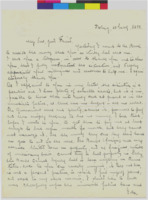
Correspondence between Gertrude Bass Warner and General Normann Munthe
Transcript:
Peking, 10 May, 1933.
My dear, good Friend,
Yesterday I went to the Bank to receive the money that you so kindly had sent me. I sent you a telegram, in order to thank you and to show you that I fully understand the situation, and deeply appreciate your willingness and readiness to help me. I again sincerely thank you.
As I explained to you in my letter, the situation is a peculiar one. I have plenty of valuable assets, but it is impossible to turn them into ready cash at present or in the immediate future, as there are no buyers—all are sellers. The Government owes me plenty, admits it, promises to pay and then simply declares it has no money. I had tried before I wrote to you to get them to pay me at least enough to live upon, month for month, but they could not manage it. All the money they can lay their hands on goes to and for the war. The Banks (foreign) will only advance limited loans on property, and as foreigners, outside of missionary bodies, cannot boy or hold property in Peking, the Banks cannot legally hold or loan anything on Chinese title-deeds/ As you can readily imagine, it has not bee, is not a pleasant position in which I find myself placed., and added to my other worries, I should like to look [] cheerfully upon the immediate future than what I do. On the other hand, I do not wish you to think for a moment that I feel demoralized or do not thank for all His Goodness to me, for I do. I know, that come what may, He will, in the future, as in the past, find a way out for me, however dark the outlook my appear to human senses. But you know how it is, and [] morbid, human self, likes to look ahead a little, and to feel that there is enough for daily needs. I am so glad for Chri. Sc. and for the blessed understanding of God, that it has brought into my life. But for this knowledge, where should I have been by this time? We are all so apt to feel worried at times, instead of contenting and friendship, and go over our past life with its many experiences, and then see and realize how God time and again, all the time, has kept His hand over us. When I think of all that He has done for me, and how little, if anything, that I have done in return for His Goodness, then I feel ashamed, and I can only say: God be merciful to me, a sinner!
This winter I passed 2 months in my bedroom, but this last week, I have been able to go down in the Garden, and to-day I went to the office; yesterday was the first day outside my gate when I went to the Bank.
I am so grateful for your friendship, I feel I can speak to you as to nobody else. I always feel you are such a fine, loyal friend. All kind and true thoughts and wishes to you, my good friend,
Ever your friend,
Normann Munthe
End of transcript.
Transcribed by Tom Fischer.
-
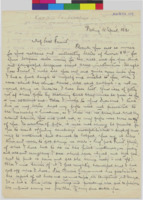
Correspondence between Gertrude Bass Warner and General Normann Munthe
Transcript:
Kuo Hsi Landscape
MWCh32:K9
Peking, 11 April, 1931.
My dear Friend,
Thank you ever so much for your welcome and interesting letter of March 8th, for your telegram with money for the roll, and for your kind and thoughtful telegram about class-instruction. All right, dear Friend, I note all you say, and quite agree with you. I had a good laugh to myself and smiled to you, when I read aout the kind donors who sent rubbish—a not unusual thing in America, I have been told. Your idea of getting rid of these gifts by declaring they must given to you is an excellent one. When I wrote to your President, I told him in my letter that my gifts were not prescribed to the University of Museum, as I knew no-one there, but that they should thank you and not one, as my gifts were there on a/c of you. In selection of gifts, it will not always be possible for you to avoid offending somebody’s susceptibilities—that, of course, may be awkward, but cannot be helped. You say it takes time and work to get things in order—my good Friend, think of what I have had to do in the first instance, in finding out all and everything I can about each object and then proceed to put it down and get the things ready—and off! When I now think of it, I feel mighty thankful that I have got off what I have. The Chinese Government has prohibited the export of art books and manuscripts, all sculptures, and bronzes. It is but a time when paintings and porcelains also will be forbidden. All imperial things are forbidden, if they can catch you.
I am welshing here with a newspaper-cutting in French, from which you will see the spirit of the Chinese on this subject: I am sorry that your bronze has not been forwarded to you. It was clearly [] out to Mr. Furman, and the container was marked for M>W. and he was requested to forward it at once to you. There may be some red tape at the bottom, but I shall attend to it surely, when I get out.
Your telegram for Mex1600 paid for the roll. In looking up you’re a/c I foud that there were Mex1098 to your credit, for which I have bought a Chien Lung Jasper Jade Vase and a very good crystal, both originally from the palace. Mr. Abert requests me to tell you that your port of entry is no longer Portland but Seattle, and that you will have to attend accordingly. I have forewarded you the 3 things, and enclose herewith the Consular Invoice. We hear that the shipment, []drum orders from Washington have been issued as regards antiques that pay no import duty. For useless red-tape recommend me to your free America. The old saying about: “God’s own country and the devil’s own Custom House,” is evidently but only too true.
The details of the roll are as follows:
Sung: Kuo-Hsi—Landscape Roll
On opening the roll: [names less than clear]
1 seal of Wan Pin Chiang
1 “” Prince You (Shan Chih)
1 seal of Wang Tao-heng (Sung)
1 “” Chao Kuai Pan (Yuan)
2 seals of Teng Chi-chang (Ming)
The roll comes from the Imperial collection, as also shown by its brocade-wrapper. You can be mighty glad that you got the things you did when you were here before—there have been no more forthcoming.
I have had my hands more than full these last 3 month—and am not through just yet—intrying to have my big imperial things by getting them out of the country before it is too late. It has takena tremendous lot of work, and cost a lot of money in dues and transport.
I sent another collection of sculptures to Los Angeles last September, but they were stopped in Tientsin and have been confiscated, without any previous articfication to the effect that export was forbidden. They do just as the please, and duties are about 6 times as much as they need to be. But all this, we can [] when we must.
I am trying my best to get away about the end of this month, April. Yes, it is time, as soon as I know, I shall write write to the C. P. Sanatorium of San Francisco. O.K. I note all you say about [] and teachers. Re the 9 collections of Chinese Art on exhibition in Los Angeles; I have heard about them, but there is nothing either singly or combined in the [] to emperors in any way with some many things. Sure, I shall look into Mrs. Richardson when I get here. I have always heard her well spoken of.
My wife is busy on her continuous [] of the history of China, from the end of Chien Lung to the Revolution and it suits her to stay on here. Godfrey is doing very well indeed, and had his first exhibition not long ago; he has certainly got talent, and zeal and application. I shall let you know first of all, as soon as I know myself when I shall be there. My—won’t we have a talk, no, talks together! I am just writing to you as I write this, and saying: another fortnight and I [] to be out of this and bound for better conditions and surroundings in every way.
All loving and kind thoughts and wishes to you, my dear Friend,
Your true friend,
Normann Munthe
End of transcript.
Transcribed by Tom Fischer.
-
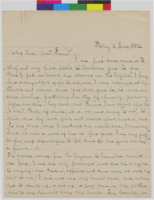
Correspondence between Gertrude Bass Warner and General Normann Munthe
Peking, 2 June, 1932.
My dear, good Friend,
I am just back again in Peking, and my first letter to America goes to you. When I got on-board the steamer in Los Angeles, I found your thoughtful gifts to me, and I was amazed at the [] and work you had gone to to send me these letters, partially written by yourself, partially type-written. My dear, dear Friend, how could you do it all? Well, of course, it is no new thing to me, to find how big and good and warm your heart is, but for all that, when I realized the work done, I also realized that it was a work of love on your part. I am very grateful to you and thankful to God that he has given me such a friend./
The passage across from Los Angeles to Manila direct was good; I was the only passenger, and had the ship all to myself; the Captian, officers, and crew were so nice and kind to me; I did not need my trunk once, but still had to stand up, or sit up, or lay down on the [] which was hardier than the trunk. From Manila, we we went to Hong Kong—Shanghai. My wife had hoped to meet me in Hong Kong on her way home, but her steamer was delayed, and I could not wait. She and Godfrey had gone to Hong Kong to see her son and daughter in law; they were then later to go to Harbin and by rail through Manchuria and on by the Siberian Railway to Berlin, where they are to stay for Godfrey’s studies.
I went to Nanking, where the government kept me 10 days, and wanted to keep in order that I might help them with some reorganization work for which they think me the most suitable person, as I know Chinese conditions so swell. It is the biggest thing that has now come my way, as it is for all China, and if only my health was all right, I should be so pleased but you see, as I do not sleep at not I cannot do any work in the morning or forenoon, but shall have to do all my work from 12 noon till evening, an arrangement that may suit me, but not the others. However, God has arranged all so [] and well before that I firmly believe that also this time, He will keep his hand over me. As my Lady says: Step by step step shall those who trust in Him that God is our refuge and strength, a very present help in trouble.
When I think of my time in America, it seems a horrible nightmare; and I should not live it over again for all the money all the world, and mind you, for all that, if I had not stayed as long as I did, I could not have put my house in order as I did.
God moves in a mysterious way, His wonder to perform, we do not always see His ways, but we may at all times be sure that if we do our little best, He will never fail us, but works out His plans for us—guides us and leads us. What a [] and help it is that this is actually so./ And so, enough for to-day, I am somewhat tired, but wanted to write first to you.
All loving and kind and true thoughts and wishes to you, and may God be ever with you, to guide you and lead you.
Ever your true friend,
Normann Munthe
P.S. You know much I wish to know you well and happy!
NM
End of transcript.
Transcribed by Tom Fischer.
-
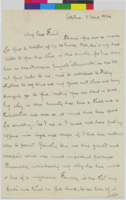
Correspondence between Gertrude Bass Warner and General Normann Munthe
Transcript:
Pasadena, 3 April 1932.
My dear Friend,
Thank you ever so much for your 2 letters, of 17 & 24 March. Well, this is my last letter to you, this time, in this country. For I am leaving here on the Norwegian freighter “N[]”, on the 9th, and your letter to me, will be addressed to Peking. Needless to say that all my good and kind and loving thoughts go to you, wishing you all that is good. My stay in this country has been a trial and a tribulation, but even so, it must have been good for something. As I see it, I could not have put my affairs into legal, safe shape if I had been well and able to proceed. Granting this, we have granted and accepted what was most important, perhaps. Personally, individually, my stay has been more or less of a nightmare. Frankly, it has tried my faith and trust in God hard, to see both of us suffer suffer. You, who are the best and most loyal friend whom I know, and who at all times are true, loving, and kind and helpful to your fellow beings, and trying to please God in the best way you know how. And there you are, going on suffering all the time. I certainly cannot see my way clearly in all this, for I also have had to face a hard fate, it seems to me. And this, no doubt, we are both wrong. For it has been said that those who suffer most on this side shall have it easier on the other side. Well, I hope it may be so.
We like to grumble and think we are hardly [], and indeed it does seem hard at times, and hard and difficult to understand, still in our deeper-down [] understanding and knowledge, we should think and feel that whatever comes to us is best, just so, only we cannot see it; but it is just the same.
Everything in connection with my affairs has been satisfactorily arranged. My art collection in the museum in the hands of a committee, considering of [names less than clear]: president Rufus von Kleinbaurd, Hector Bryan, Professor Dr. Van Koeular, H. Comestock (Museum), and Rev. House. This committee will canvas for subscriptions to buy the rest of the collection, and feel confident they can do so, as soon as better times set in, which they expect in the course of the year; but they are starting canvassing at once, as far as that goes. My auxiliary collection is in the hands of the Rev. K. House, a good, reliable and capable man. Mr. Furman is evidently out of it. I am telling you all this somewhat circumstantially, as you have so often referred to it./
I thank you for each an all loving thoughts that you have sent my way while in this contry, and can assure you they have found a ready response in my heart.
All loving and kind and true thoughts and wishes to you, and may God ever [] you, my good and loyal Friend.
Ever your friend,
Normann Munthe
End of transcript.
Transcribed by Tom Fischer.
-
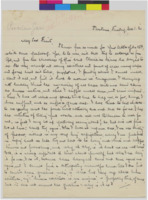
Correspondence between Gertrude Bass Warner and General Normann Munthe
Transcript:
Porcelain Jar
See file Albert, G. E. Peking, China
Pasadena, Tuesday, Dec 1. 31.
12/1/31
My dear Friend,
Thank you so much for your letter of No. 28th, which came yesterday. Yes, to be sure, evil does try to estrange us from God, and from the kindess of Him that Christian Science has brought to us. The way, wherefor[e] our seeming existence and power of these many shapes and forms that evil takes, [], I frankly admit I cannot understand it all, and find it hard to overcome its consequences. I [] up and honestly know the un-reality of all these evils and their claims on human nature, and these I suffer [] them, and their impositions. I have not asked any practitioner here to help me, so far, though I have suffered, and do suffer a great deal. I have tried to bear it, so as to see exactly what the practitioners actually can an and does do for me. I have the intention of taking your advice, and all Mrs Richardson to work for me, in fact I rang her up yesterday evening about 7:30, but did not find her at home; shall try again. When I look at my arm case, I am also thinking of your case; without in any way being [], surely I am justified in saying least we [] try our best to be loving and kind and helpful towards our friendship, and why, or why, is it that we are not better? Well, it is always difficult to talk about yourself, but when I am doing it for once, I do it, because these thoughts come and came again and again, and I cannot find a satisfactory answer for them. All I can find to counter these questions with is what Mrs. Eddy says about human existence []: ‘human existence is an enigma”—perfectly true, of course, but it does not answer the question: why is it so?/
But the same kind of thoughts must have presented themselves to you from time to time, and I dare say, you think pretty much the same?/
You ask me about the Sung jar that I sent you. I shall tell you what I know, and what I do not know about this ware. The Chinese call this ware, like so many others, merely Sung ware: the reason being that the objects being thus designated are to name that the original names—if they originally had any special name, have in the course of time, got lost: Tzu Chan is as far as I know, a piece of manufacture of different kinds of ware, in Honan province and for the slect times down to the present day. Hebson in Hui Fook or [] many wares as Tzu Chan-ware, with what justice I cannot say. I fancy this certification of so many different kinds as Tzu Chan-ware, will only stand till we, though systematic and scientific excavation in China—and this is but a matter of time—shall be in a position to certify these objects more concretely. Of course, a rose by any other name smells just as sweet, so any new certification will in no away interfere with our appreciation of these objects. To look back then: Hobson calls this ware Tzu Chan ware, and so we do likewise, for the time being: It is very nice—the genuine ones, and I had not seen any, till I got these from the Emperor. They had been paired to some of the banks, and I got them by redeeming them and by paying [] to the E. Anything imperial is in a better condition than anything that you can get on the market, because only the very best things were sent to and kept in the Palace; as you will also observe in your picture rolls. I should [] [] I had to to a museum [] from America, when I was in Peking, and asked him if he had seen of this kind in America, and he said, yes, he had seem one piece at a dealer’s in San Francisco; it was not as large nor so good as mine—which again was not as grand as the jar that you have got and the price was $3.000. I reckoned the price of the jar would be about 10.000 at a dealer’s, and therefore [] the price of $6.000 for the pair on my invoice here as you will see from [] prices—which kindly refer to me for the [] here. When you asked me to get you something for $800, I had first in mind to give you 2 smaller ones, but when I came to look over the [] collection of what I had sent over this time, I concluded I wanted to give you something of the very best, and something that you did not have. Mr. House told me that Professor Emmonds [?] (Parnes?) had taken a great liking to this pair, and he thought [] want them, so finally I made up my mind to let you have one. The price to you is neither more nor less than $800 that you wanted to invest, for the one sent you. I shall when I go back to China, try to pick up whatever information I can on this subject and in due course of time, let you know./
Re Mr. F I am [] Mr. House and another friend in full chance of all the things that I have sent over this time.
As regards the original collection, I am trying to force a committee of trustees of lading museum-men here to take charge of it for the future. Mr. F. will be eliminated.
Enough for to-day. All loving and true thoughts and wishes to you, my dear Friend,
Ever your friend,
Normann Munthe
Air Mail
1931
Porcelain jar
Mrs. G. B. Warner,
Osburn Hotel,
Eugene, Oregon
L. P. A.
End of transcript.
Transcribed by Tom Fischer.
-
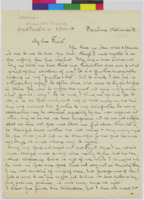
Correspondence between Gertrude Bass Warner and General Normann Munthe
Transcript:
Loaned—Wine-jar-bronze
C-1055 Porcelain $800=*
Pasadena, 19 November ’31.
11/19/31
My dear Friend,
You have no idea what a pleasure it was to me to have you here; though I much regretted to see you suffering from your accident. Why, why is there sickness and why are there all these trials and tribulations that seem part and parcel of this existence of ours? It is a question that so often comes up in my “question-box”! And to which I can find no satisfactory reply!? So often those, who seem to try the hardest to please god, seem to suffer the most, and again y question-box queries: why? To be sure, I knew, all we have go to do is to do God’s will, and all is well with us, but this does not answer the question to my satisfaction. So many explanations may be advanced, especially by the non-sufferers, and still, being as we are, we bear comparisons and we are not satisfied that we have not got more than our fair share. Still, let us be thankful that matter are not worse—they surely might be, you know; and let us be thankful for the good God sends us, though it is not always easy to rejoice.
Sorry, my good and loyal and dear Friend that I am not in a more cheerful mood to-day when writing to you, but this constant sleeplessness takes it out of me. Still I know all will be well, in God’s own good time and way and in thinking thus I am not thinking of myself alone, but perhaps more of you; I feel so sorry to see you suffer and to know it had [] to [], but patience, patience, it will surely come all right! I liked your friend, Mrs. Richardson, but I have not asked her or or anybody else for that matter, as I wanted to find out first what the effects of my new surroundings would be, so as to be able to know and to feel what was due to so-called nature, and what was due to the practitioner’s efforts, but I must tell someone, for it is getting too much for me again. I am not going to ask Mrs. Richardson or anyone else till I hear from you in reply to this, so here goes my “question-box”! Are you satisfied that she actually helped you, or are you only wishing to do her a good turn? In other words, do you consider her an efficient, successful practitioner? If you really feel she is, well and good, I shall ask her, and in that case, please send me a note. If you do not feel sure and confident, I shall try someone else. Now my dear Friend, think the matter over and act accordingly.
Mr. Hanes is kindness itself, and comes in every night from time to time, when he [] and [], the attacks are too much for me. Nobody could be more truly kind and authentic than what he is in every way. (C-1054) He is in this moment packing the Sung Tzu Chan wine jar with cover that I am sending you. We are sending the jar in one box and the cover in another and sending them in plenty-big boxes, securely and well packed. It is one of the finest specimen of this kind of Tzu Chan ware, and with the exception of one [] pair that I have, the biggest and finest I know of in this country. I got it from the Emp. [?] the antique stand was [], and there was no time to get a new one made. It was, or rather is, one of a pair, but someone has had particularly reworked this pair, and as I [] you to have the best one. I have divided the pair. I had originally originally included to give you 2 small ones of the same family, but as I looked all over my auxiliary collection, I came to the conclusion that I wanted to give you what I considered the best. I can only that it will be appeal to you as it does to us who have seen it and appreciate its quality and value.
And so, enough for to-day, I am getting tired, and I want them to go by to-day’s mail. The parcels are going also, and are being sent y the American Railway Express, Mr. House tells me.
All loving and kind and true thoughts and wishes to you, my dear Friend,
Ever your good friend,
Normann Munthe
(*Mrs Warner told me in 1933 that she paid Gen Munthe 800.00)
1931
Wine Jar loan
Jar
Mrs Murray Warner,
University of Oregon,
Eugene,
Oregon.
From
General J. N. Munthe
923 E. California Rd
Pasadena,
Calif.
End of transcript.
Transcribed by Tom Fischer.
-
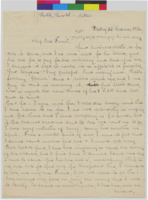
Correspondence between Gertrude Bass Warner and General Normann Munthe
Transcript:
Noble, [Harold]—letter
Peking, 22 December, 1930.
(Please give my kind wishes to Mrs. Perkins: NM)
My dear Friend,
Your business-letter, as you call it came, and I at once sent for Mr. Albert, gave him the fee to pay for the university, and here you are. I thought it best to make it as official as possible. Your telegram: “Very grateful. Sent nothing more. Letter following. Warner.” came a little while ago, and I am going to wait in answering it till your letter comes, also as regards the remittance of Mex$4.287 that has come to hand.
Now—yes—I agree with you. I also can hardly wait till I come across to see you. I am not delineating in anyway and God knows that I leave everything in His hands, but if God does not show me that He does not want me to go, I have every intention of coming, leaving here sometime in April. From a mental point of view, I seem to feel that I cannot stand another year here—I must get away. These last 10 years, I have been improving as regards the violence of the attacks, but I find that I cannot stand [] that I used to stand. God has been, and is, wonderfully kind to me, and but for Him and His Omnipotent Love, I should not be here, and my dear Friend, I do not want to go till I have received my plan in giving the mony that I make to charity. In this, as in everything else, I have been and am constantly constantly asking God to lead me and to guide me in the way He wants me to go, and somehow I seem to feel that He will hold His hand over me and my work till it is n accomplished fact; and when it is, I shall feel that I have not lived my life in vain.
There is so much to contend with here, and I feel that I must get away in order to breathe a kinder atmosphere. A year ago, you two were here, and what a loving, harmonious time we had together; the happiest time that I had spent for many years, as I told you.
Of course, I am looking forward to seeing you again, and I hope we shall both together see as much of Christian Science as what we can, also visit some of the museums together. Well, well, my dear Friend, we, all of us, and the [] universes are all in God’s hand, it is for him to say what shall be or shall not be, but as I have said above: I seem to feel that I have His blessing in my undertaking. No news from Los Angeles; I fancy Mr. Furman has is difficulties, on account of the tightness of the money [], but all this does not worry me, for it is all in His hands and it is not a question of this or that, but all the Time of God and of what He decides, and whatever He decided is sure to be for the best. All loving and true thoughts and wishes to you, my dear Friend,
Ever your friend,
Normann Munthe
End of transcript.
Transcribed by Tom Fischer.
-
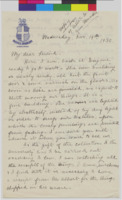
Correspondence between Gertrude Bass Warner and General Normann Munthe
Transcript:
Hotel Osburn
Eugene, Oregon
Copy of letter to Gen. Munthe
Wednesday, Nov. 19th 1930.
My dear Friend,
Here I am, back at Eugene ready to go to work—the new building is nearly ready, all but its front door & some varnish on the floors. As soon as these are finished, we expect to starting moving our things. It is a fine building—the rooms are lighted by electricity, instead of by the day light in order to keep our textiles, upon which the lovely paintings are all painted from fading—I am sure you will admire it when you come to see us.
As the gift of the collection to the university has to be carried out according to law, I am collecting all the receipts of the things I have purchased. I find that it is necessary to have a receipt—from Mr. Albert—for the things shipped in his name.
I am enclosing a typed statement for him to sign & I am asking you, my dear friend, to see that he signs it, dates it, and you, or some other adult foreigner also sign it as a witness—because the University requires receipts for everything—and quite properly. When it is finished, please return it to me as quickly as possible—as my report will be waiting for it.
This is only a business letter, I will write again soon and then we will talk about our beloved Christian Science. With all good wishes, for all good to you, dear Friend.
Faithfully yours
G.B.W.
End of transcript.
Transcribed by Tom Fischer.
-
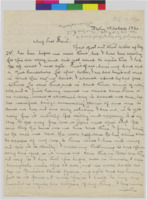
Correspondence between Gertrude Bass Warner and General Normann Munthe
Transcript:
Oct-19-1930
(All loving and true thoughts and wishes to you, my dear Friend, your good Friend, Normann Munthe)
Peking 19 October, 1930.
My dear Friend,
Your good and kind letter of Aug 23rd. has been before some time, but I have been working for you all along and did not want to write till I had got off what I was after. First of all, here’s my hand and a good handshake for your letter, I see the logic and sense in what you say, no doubt. I should [] by the [] for some time and in that time think of nothing else and a pride healthy would no doubt come. There is no reason, [] or otherwise why it should not come, but the [] daily-ceremony claims of [] seem to ground me here, and the only solution I can see is to get away from it entirely. God willing and approving, it is my idea to get away from here in April next year. That God will keep His hand over me till that time, I firmly believe, as He will not leave His work half-done. He has shown that he approves of my idea to take what I have with money and give it to charity. I made my testament to this effect early this year, so it must [] came true in Good and [] and every/ As I have told you before, once in America, I shall communicate with you a once and we shall do all we can in Christian Science together, and after that the Museum. Just as it pleases and suits you as I shall be my own master as regards the disposal of my time. I have numerous invitations invitations to come and stay with people, but I am not fond of staying with others in contradiction to my wife, who adores it. It suits my wife best to remain here while I go on leave, as she is writing the continuations of he history of China, and can do that best here./
Begin here
As I told you in my last letter, I enclosed your bronze, well-packed and addressed to you, in the lot of bronzes that I sent by freight to Los Angeles. I can now report that your Imperial Capital together with the other things that I have got for you have been safely sent, and I enclose documents and photographs herewith.
Your crystal was mortgaged for $1200 and with interest he came to $1600. The bronze you paid for while here. I mean the important one. You asked me to be on the look-out for a painting, a roll, black-and-white on paper, well-attended []. I commissioned with my good man man, but so far nothing has turned up. If you have cash to spend, now is the time, for you get Mex 3.50 about for 1 gold. Of course, Chinese things are going up, but not so rapidly.
Not long ago, the crystal man told me he could get 3 fine pieces of crystal for $2400. I told him to buy them []. It was one vase, as tall as yours, one tripod with [], and one of Emperor Chien Lung’s official seals that he used when residing at the summer palace—all my [] things with inscriptions. I brought them at once for you and I am sure you will like them. There are inscriptions on all these and the translations will be sent you in due course of time, when the man who used to help me can find the time, he is too busy at present.
I have sent off almost another collection to Los Angeles, and have told them I intend to make them a gift of this and if they will [] at once—which I doubt they will, as money is scarce. Well, which getting things moody one of my good men brought along a pair of Yong-Cheng enamel [] []. The [] [] that I have come across and a splendid specimen of Yong-Cheng enamel-ware. I could not resist the temptation so bought them and having done so, came to the conclusion that one would be enough for Los Angeles, and that I would present the other to your museum, my dear Friend, so I have sent it with the crystals.
As I said above, these are all imperial things. While I remember it, there are in most crystals veins in the [], that others look like beaks As far as I understand it, a vein is generally feet, if on the surface, on one side only. A beak would be feet on feet on both sides. What you see on your crystals are veins, not breaks.
You sent me Mex $1702, if I remember rightly. I have paid out as follows:
One bronze bell $600
One crystal vase 1600
One crystal vase \
One “” tripod ----- 2400
“” Seal--------------/
I do not know exactly what Mr. Albert charges one, as he is in Tientsin, but we can say,
300
=
Mex 4.900
Pair -1702
=
Balance to me 3.198
I can correct it later, if wrong.
I shall send you the translations, as soon as the translator finds time.
End of transcript.
Transcribed by Tom Fischer.
-
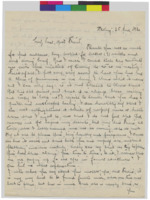
Correspondence between Gertrude Bass Warner and General Normann Munthe
Transcript:
Peking, 25 June 1930.
My dear, good Friend,
Thank you ever so much for your welcome, long-looked-for letters (3) written and sent during May. How I wish I could talk contents over with you instead of having to do so in writing! First of all, I feel very very sorry to hear you had had a claim of pneumonia [][][], I know what it means and I can only say: is it not believed to know that God has all pains and that it is always there, willing and ready help us? I rejoice to think that you had a quick and successful healing. I can honestly say that I am not self-righteous or think of myself as more or better than what I ought to, nor that I do not feel that God rewards me far beyond my deserts, but my dear Friend, at times, when I look around and see so many who do not try at all to please Him, being healthy and prosperous, I cannot see how it works out that both you and myself, who, without flattering ourselves unduly, surely can say that we try to please Him, how these [] from time to time. Is it, I wonder that we are paying up for our sins in former existences? I can find no other explanation.
I make what you say about your mother; yes, dear Friend, it is is very, very hard to be found fault with, when one tries one’s best to please, but bear in mind that she is nearly blind, as you as you say, and also bear in mind that we are never sorry for having been too kind and confiding, even if we are taken in from time to time. It is better to be too kind than the reverse. God is Love, and we must try to reflect it as much as we can, and I know no person who is keener alone to kindness than what you are, nor do I know of anyone, who shows in her acts that she is kind and thoughtful than what you do. I take my hat off for you and consider your friendship a gift from God—all sunshine and now shadows./
I note all you try about [] packing: I saw him pack your things in my dining-room, and we both fail to understand how the things got broken; probably the cotton, as you saw, was not suitable and became too hard, and lost its elasticity. He must use excelsior in the future. I am so sorry so many things were broken, and shall try to make up for your losses, when I send again. [] to me the egg-shell that was broken, I do not remember it. I have noted one aubergine, and the Poug-de-boeuf [?] broken.
Glad you liked the bell, I got it very cheap, and my good luck, it it had been pawned. I got your Mex 1741 for the crystal, it had alas been pawned for $1700 and it will come to about $1600, [] of customs and freight, it is the most beautiful you have seen, as you will realize when you get it. There is [] in the Customs at present, but it will be sent you as soon as permitted. I expect within a fortnight. I hear, and [][]this one, as regards quality was sold in Tientsin to a Chinese for $5.000. As you will have seen from the papers perhaps the Mexican dollar has gone down from one gold dollar=2.20 to 3.80 these last 6 months. Lots of people have come here to buy things while the Mex is down, but the customs is collecting on a gold basis, and I am afraid all will have to come to that.
I note all you say about coming to America; I cannot come till I get my second installment, and that will probably not be till next January to judge from this year’s experience. I have offered to make them a [] present value on G $200.000 if they will settle with me this year—the 2 installments in out, and Mr. Furman in trying for this!
I shall, when do come, let you know, and probably see you before I do anything else.
What a blessed, peaceful time we had, we 3, when you were here—is it excluded that you come out this way again! Before I come home! You know, you are much more a frequent of your movements than what I am. I am longing to see you again, and once in America, wecan see and discuss all under God’s Gods guidance, what is best to do.
I have had a very trying and tiring time, and it has taken longer than usual for me, this year, to feel any improvement. This last week, I seem to feel more in touch with God, as it were, and it is a feeling that both makes me feel happier and btetter from every point of view. Yes, the wife has taken one of the pavilions in the Summer Palace, and she and Godfrey live there. They go out Monday morning and come back Saturday morning, passing Saturday and Sunday in town so as to go to the cinema and attend other social functions. I have not been out there, but I hear it is very fine.
And now, my dear Friend, here I am sitting all alone in my garden. It is just 8 o’clock and the darkness is already dawn. All loving and true thoughts and wishes to you and to Mrs. Perkins; and again—whisper it not in Gath—some extra ones for yourself.
Ever your friend,
Normann Munthe
End of transcript.
Transcribed by Tom Fischer.
-
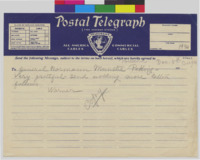
Correspondence between Gertrude Bass Warner and General Normann Munthe
Transcript:
Postal Telegraph (The Mackay System)…
Send the following message, subject to the terms on back hereof, which are hereby agree to
Portland Dec. 5th 1930 Oregon
To General Normann Munthe Peiping
Very grateful-send nothing more letter follows
Warner
Copy
End of transcript.
Transcribed by Tom Fischer.
-
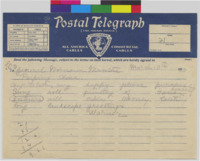
Correspondence between Gertrude Bass Warner and General Normann Munthe
Transcript:
Postal Telegraph (The Mackay System)…
Send the following Message, subject to the terms on back hereof, which are hereby agree to
To General Normann Munthe, Peiping China, March 10th 1930.
Congratulations very happy please purchase Sung roll painting of Han dynasty soldiers will cable money later long landscape greetings
Warner
21
46
=
126
84
=
966
…
End of transcript.
Transcribed by Tom Fischer.
-
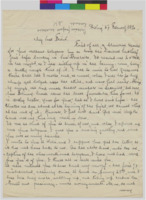
Correspondence between Gertrude Bass Warner and General Normann Munthe
Transcript:
Peking, 27 February, 1930.
My dear Friend,
First of all, a thousand thanks for your welcome telegram from the “President McKinley” just before landing in San Francisco. It reached me 2 o’clock in the night, as I was sitting up in the drawing room, having a pretty rough time of it. I had to [wise] to [Mrs. Greenwood] twice these last 3 weeks, and, as usual, when I ask her for help, always get helped over the [skill], and never feel easier—Strangely enough we had much colder weather in December: but somehow February, March seems the least favourable [sic] time for me. It is getting better, year for year, but as I have said before: the [Kuoce] we can stand at the beginning of the fight, we cannot stand at the end of it. However, I feel sure that God will keep His hand over me till my work is done.
It was so kind of you to think of me, and when I opened and read your telegram, I gave you a [] greeting, and sent you ever so many thanks.
I wrote to you to Kobe, and I suppose you got the letter, as it has not come ack to me. On the other hand, with the exception of aforementioned telegram, I have not had word from you or of you. I trust all is well with you.
It will interest you to hear that my money—the first 1/3 installment, actually came to hand on January 28th, and I have been [] twice, settling up and taking up certain contracts and previously-made arrangements. No, we do not worry [Munthe 2/27/30 see packing list date 2/24/30] worry, I am not [burdening] myself down too much or so that I cannot get away. I have told the wife that I want to go to America, as soon as the most important things can be arranged for, and leave her and Godfrey here. This suits her very well, as the is going to continue her history of China. From the death of Ch’ien Lung, where it starts, down to the Revolution 1911. I have just sent off the following things for you:
1. The Ming roll of painting by Lü Fong, which you forgot;
2. The piece of imperial yellow silk, as actually used in the Palace, that I promised you, but could not get before. [Ku’Yue-sien-Morant p-246, 54]
3. One pair of Ch’ien Lung Ku Yueh Hsien vases. The quotations by the Emperor Ch’ien Lung reads: “A few branches will be sufficient for prosperity. It will be full of leaves throughout the four seasons.” [MWCh23:9;MWCh23:10/C-85,C-86]
The 3 red-and-gold insects on the shoulder of the vases indicate that the vases were made for the 30th birthday of Emperor Chien Lung.
I have merely put on a nominal value for obvious reasons; the actual value here would be Mex25.000. You have no idea what a pleasure it is for me to send these to you. None deserves it better, for you are the most generous minded soul that I know, always thinking of giving pleasure to others, and always doing so, and without making any fuss or song about it.
4. You asked me to get you a bronze bell; well, it did not materialize while you were here, but did [C-47/MWCh6:46] did so not long ago. It is a Chou bronze with very fine decorations, in good conditions, and with fair polish. You are asked to pay Mex$600 for it—no price at all. It comes from the same person from whence you got the Mex 2500 one, and had been [], and I redeemed it.
The expensive one is just too heavy to go through the mail, but you will get it, as soon as I get something to make up a sending by freight. I have been on the point of redeeming the [] crystal; but as you said, you did not want it before May, I did not wish to act against you wishes. Let me know if there is anything that I can get for you, and it will be a pleasure to do so.
I am looking forward to so much now that the first necessary step has been taken, but most of all to come to America—to see, hear, and learn I can of Christian Science.
All loving and Kind and true thoughts and wishes to you, my dear Friend,
Ever your friend,
Normann Munthe
Kindly remember me to Mrs. Perkins and the other ladies, whom I know. NM
End of transcript.
Transcribed by Tom Fischer.
-
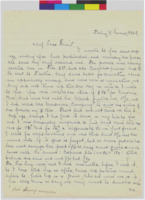
Correspondence between Gertrude Bass Warner and General Normann Munthe
Transcript:
Peking, 9 March 1929.
My dear Friend,
I wrote to you some days ago, sending you full particulars, and enclosing the papers the same day they reached. The parcels were actually posted here on Feb. 23rd, but the consular papers had to be sent to Tientsin, they come back for completion—there are apparently always some news rules or regulations, and they did not know up till this day on which I wrote to you. You will notice the item of $56.00 for insurance. Were that was the rate Mr. Albert quoted me, 1%, and I had asked the insurance company to curb the value of the parcels, [viz] $5650. Their bill did not come in till 2 days ago, though I had put it down on my bill to you, and I was presumably surprised to find that their bill was not for $5[6].00, but for $16.00, a difference of 40 in your [favor]. I asked for explanations, and was told that 10% was the usual rate if it goes as freight, but as these parcels had been sent through the post office, they could quote a much lower rate. So compact: expenses 220 (less 40)= 180, total balance on this end not 770 but 730.
The Lui Sung-nien [sic, Liu Sung-nien?] roll I had remarked before I sent it. As I have told you so often, these old pictures must either be posted up on a frame like all mine use, or if you keep them as they are, they must be handled with the [Lui Seng nien] the greatest care. They should not be unnecessarily shown. In rolling them up they must be firmly and tightly rolled up; the least slack breaks the silk. The rolls should be rolled up evenly and firmly. When you have done that stand up—just one end of the roll against the top of a table. Flaunt your middle finger (right or left, as it suits) firmly on the top center part of the roll, grasp the roll around the middle with your full other hand. Now turn the roll with the full hand, tightening up the roll; your middle-finder pressing the roll against the table, thus making the core of the roll sets as a pivot. If you do this every time, you will be able to tighten up the roll properly. But always bear in mind: old paintings are old paintings, and must be handled with the greatest care, and should not be unnecessarily shown to everybody, but only on occasion and to people who understand. / I am looking forward to the spring: the winter has been such a trial to me these last 7 years. God has held His hand over me, or I should not be here now, but it is not always so easy. One thing is certain, when I get over there, I shall have gained an understanding and patience that nothing else could have given me.
All loving and true thoughts and wishes to you, my dear Friend,
Your friend,
Normann Munthe
End of transcript.
Transcribed by Tom Fischer.
-
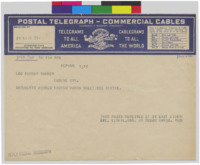
Correspondence between General Normann Munthe and Murray Warner
Transcript:
Postal Telegraph-Commercial Cables Clarence H. MacKay, President
Telegrams to All America
Cablegrams to all the World
The MacKay System
Postal Telegraph Commerical Cables
“The Pulse of the World”
This is a full-rate Telegram or Cablegram unless otherwise indicated by signal in the check or in the address.
Blue—Day Letter
NL—Night Letter
Nite—Night Telegram
LCO—Deferred
NLT—Cable Letter
WLT—Week End Letter
Received at
21 East 8th
Standard Time Indicated on This Message
3POB 8 AM 10 VIA RCA
PEPING 1315
LCO MURRAY WARNER
EUGENE OGN.
DOCUMENTS POSTED FOURTH MARCH GREETINGS MUNTHE.
THIS RADIO RECEIVED AT 21 EAST EIGHTH AVE., EUGENE, OGN. AT 820AM MAR30, 1929
REPLY POSTAL TELEGRAPH
End of transcript.
Transcribed by Tom Fischer.
-
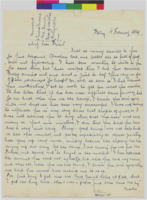
Correspondence between Gertrude Bass Warner and General Normann Munthe
Transcript:
[Note: roll is probably not roll, but actual intent unclear atm]
Peking, 4 February 1929.
My dear Friend,
[] so many thanks to you for your telegram, Christmas card, and letter all so full of good will and friendship. I have been wanting to write to you for some time but have waited till I had your commission fully carried out and that is just to-day. Your cheque for $2000 exchanged for Mex$4.3000, and as soon as I had received your instructions, I set to work to get you what you wanted. It has taken time, it has been more difficult than formerly, but for all hat, when you see the things, I thinking you will agree with me that we have been very successful. I have not wished to influence you in any way these last couple of years, so I have not advised you to buy. Now that you have sent some money on your own initiative, I can tell you that you have done a very wise thing. Things—good things—are not to e had on the open market, and prices, especially as regards paintings have gone up very much, simply because the supply has been drying up all along. All the things I am sending you are from the Palace; and could not be bought on the market. I have exceeded the amount you sent me by Mex 770, but when you read my letters and above all, when you see thing things, I think you will agree with me that you would have wished me to do so.
The first thing I got was the Red [] Lotus at $250. Next I got the Song Dolls, 1400+1000=$2400, and then came the beautiful crystal vase and the pair of rose quartz vases together. If I had kept within the amount sent, I should have had to split up these 3, and so doing would have had to give so much for what I wanted to keep that the left one would be a bargain. As it was I got the 3 so cheap, Mex $2200, that I considered I would not act in your best interests if I did not receive all 3. The price for the 3 is 2200, but I have had to specify them separately, so the a/c stands as follows:
1 Song Roll, [] and [], by Li An- $1400 (MWCh32:L9/C-613)
1 Song Roll, Landscape, by Liu Sung-nien- 1000 (MWCh32:L1)
1 Ch’ien Lung, Crystal Vase 1300 (MWCh3:42/C-521)
1 Ch’ien Luung, Rose Quartz Vases (?) 900 (MWCh3:38/C-510, MWCh3:39/C-511)
1 Ch’ien Lung, Rose Quartz Lotus 250 (MWCh:3:40/C-512)
Expenses: Boxes, packing $25
Mr. Albert $50
Customs dues 52.50
Parcel post 15.06
C[] Invoices 6.50
Photographs 15.25
Measures 56.50
Sum 220.81
}
Expenses 4.850
220
=
5.070
4.300 (Received $4.300)
=Balance $770
I have put Albert down for $50, if you feel inclined to give to give [] a little more do so. He has evaded me to get the things out, and at a week returned [], so as to avoid calling attention to [] the things.
[see vase when it comes from storage]
Things really were, right from the Palace.
Now for a few detailed remarks. All seals etc. You will find translated on the special [] enclosed papers. The Red Quartz Lotus has Emperor Ch’ien Lung’s seal [we’ve determined], indicating that it was a piece he was particularly fond of. The Crystal Vase has on the top of the rest of the cave also Ch’ien Lung’s seal, indicating it was a personal thing, and in addition quotations by the same emperor. These have not been easy to translate, but we have done the best we can. If you think you can find better expression in Eugene than what we have found, by all means do so.
The Sung Roll Birds & Flowers, by Li An [MWCh32:L9] was said to be one of the finest of its kind in the Palace Collections and, if not the best I have seen of this kind.
The Landscape Roll by Liu Sung-nien [C-606 MWCh32:L1] is very good and has much atmosphere, especially I think around the reeds. It depicts the famous poet Su Tung-pu [Su Tung-p’o/Su Dongpo?] entertaining some friends. The long pieces of poetry is by the famous Yuan painter Chao Meng-fu.
You will notice that these 2 rolls come to you in their original brocade covers, as they were kept in the Palace. I have been particularly fortunate in attaining them with their covers as this is never done. The covers are always retained and displayed in order that people may not be able to trace them back to the Palace. I only got them by solemnly promising that they would not be shown to anyone here and should be sent out of the country at once. I think you will find this interesting, as I show you have carefully the sex paintings were looked after in the Palace. All these things could not be had on the market, and if they could be had, would cost several times more than what you have given. There seems to have been a strong foreign demand for roll paintings these last few years, for they are very scarce, and very dear, I hear. Personally I have none of the quality of the Li An Roll, nor have I bought any quality roll since you were here last.
Before the revolution, peach-[flower] and apple-green porcelain were very scarce, and very expensive. When the palaces were looted (cut read[?]) in 1922-24, a good many of these 2 kinds came out and I took the opportunity of buying as many as I then could. In making up the parcels for you—they were parceled here on Feb. 23-but I hve only got the final papers to-day—it struck me that, as far as I know, you have no apple-green in your collections, and so I send you one, with my love and good wishes to you and your museum.
It is a Sung-Chung [?] apple-green and comes from the palace. The Chinese prefer to apple-green to be as light in colour as possible, and the one I send you is said to be very good.
As I could not give the Court as vendors, nor get any receipt from them, I have had Mr. Lowell make out the necessary receipt, but nothing is from him. When he made out the decorations or [] here in my house, he remarked that you had got them very cheap indeed, and he knows the prices. Mr. Albert helped me to pass the things through the Customs, and work out the Consular services.
I have considered it necessary to photograph the things so as to prevent any substitution either in packing here or as results.
You ask me in our letter to price certain things that you have preciously bought so as to arrive at the American Value of them. I see what you mean, but, of course, I do not know what prices similar things fetch in America, even if they could be had. However, we can arrive at a very fair estimate. Is the first piece, you got your things very cheaply and for under market value. You should then have to value them only from time to time. I should be inclined to and at least 300% as an antique, and I shall tell you why. 2 years ago I was asked to price some paintings in [Yamanaka’s] pieces here. I found that he charged 4 times what I could get the same things or similar thing for here. Another thing, I know that foreign dealers buying antiquities here, reckon with a profit of 300%. To sum up, I cannot remember the individual things on your list, and in order to expertize and value such things, I must see them, study them, and then give a justified and just estimate. If you, for the time being, do as the dealers do, add 300% to the prices for which you have bought them, you are within a very safe, modest estimate, for you got them cheaper than what they get their things, as they rely on the market, and I buy privately. When I come to America, which will probably be next year, I shall come and see you and your museum, and I can then expertize and value what you have given them. /over
My dear Friend,
I have got that far, and now feel easier in mind, but alas friend. You know the winter is []ther an enemy these last 6 years that I have found it very difficult to overcome, and only God and his Omnipotent Love have made it possible, and I feel very grateful. But for Him, I should not be here. My work is still before and before that is done, I cannot go.
I expect to have a decision by the end of the year. The council, or rather the President of the Council wrote and asked for an extension till the end of the year wen they hoped they found could be arranged. All the public bodies in Los Angeles have written in to the Council requesting that the Collection be secured for Los Angeles.
The Metropolitan and all the leading museums in America are willing to take parts of the collection, but none of them has room for the whole lot.
However, that is all in God’s Hands, I am doing His work in this matter. All the things are His, not mine.
When I do come, I am coming to see you. You will be sure, and we can then give a a fair estimate of your gift.
All loving and true thoughts and wishes for you, my dear Friend,
Your friend,
Normann Munthe
End of transcript.
Transcribed by Tom Fischer.
-
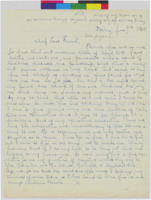
Correspondence between Gertrude Bass Warner and General Normann Munthe
Transcript:
Many thanks for Mrs. Potter’s greetings. Kindly remember me to her and to Mrs. Perkins. NM
Peking, June 7th, 1929.
My dear Friend,
Thank you ever so much for your kind and welcome letter of April 20th. Your letter, and-not-all, are permeated with a spirit of kindness, goodwill, and friendship, that finds a happy and joyous [rest with] in my heart. And added to this, you are always so generous in your praise for whatever one can do for you. All this is the right spirit, my friend, the spirit of love and kindness, the only one that moves us forward and upward, and it surely does do that. How often do I most wish I could be near you, be with you, and exchange thoughts and ideas. I seem to gain ground more and more in spite of all the trials and tribulations that I have to go through. It is probably a part of my spiritual education. More and more the realization and understanding of God’s Allness is coming to me. He is becoming more and more creative, real [tough] so to speak. I see all in Him, I find all in Him, and I look to Him in all things, not to anyone else, knowing full-well that if I do my best to be loving and kind and helpful to my fellow-man, He will surely find a good solution for all my questions, of whatever nature they may be. Yes, God is All, and His Allness, His Might, is Omnipotent Love. Aye, not for all that world can offer would I exchange my knowledge of what God is, as I have learnt to know Him in and through Christian Science.
You tell me that you intend to settle down when Sam takes up his duties at Harvard. This is but natural that you should do so, and as you are oriented by and with harmony, it should be a harmonious existence with you all together. I think it must be a tremendous compliment to Sam to be asked to believe of Harvard and as a 9-Years-contracts, for they would not ask everyone at Harvard but the very best. I take my hat off to him!
I was glad to hear that the things, which I got for you had arrived all right, and that you liked them, especially that you liked the [C-399] applegreen. For that was especially a gift and greeting from me to you. When you get your own house, I shall surely find some things for you and your house. It is easier, I think, to find things for a house than for a museum. You were kind enough to send by [mail] $900. For there and so for the lovely greeting that came with them, I was, and am, most grateful. The amended bill was $730, so there is a balance of $170 in your account. Oh, yes, I see well enough what you say, to deal it and to the package, no, there is no call for that, and they must stand to your credit.
About my collection in Los Angeles, I can now give you more details than what I could before. When Mr. Furman came over here, nearly 3 years ago, he was backed by the Director of the Museum, Mr. Bryan, and by some of the leading and richest citizens in Los Angeles. Everything seemed to be cut and dry. Just as the first thing arrived, a strong campaign was launched Mr. Bryan and talks of his ownership. Mr. Bryan got heart disease and had go to abroad for 18 months. His friends had more than managed to fight his battles and keep him in his position, and did not consider it wise to fund the acquisition of my collections. Mr. Bryan came back a year ago and has used this time mainly in mending his fences. The first backer came to the conclusion that as the [] was mostly [interested] in the collection, the [] should pay for it through public funs (the County Council). It was then suggested that it should be bought in 3 years installments, and the first installment was on the budget a year ago. The budget is passed ordinarily on or about July 1st. At the last moment it was suggested that a County Hospital should be built, costing 12 – 15 []. This was considered more important than anything else, and in order not be over the top, they had to cut out other terms, to the tune of [] 4 [], and my installment amongst these. This year they do not expect this trouble, and seem very sanguine and helpful. Los Angeles is the only place in American where they have room for the collection. All the leading museums are anxious to have parts but they have not room, as most of them can only allow 1/10 of the floor room for the Chinese department. Thank you for offering to ease my protestors thoughts—give me your usual kind and helpful thoughts and they will surely help. The whole thing has taken such an unexpected long turn, which has made it very awkward for me [] of times; but God has always arranged all for the best, and He surely will do so till the end.
And loving and kind and fine thoughts and works to you, my dear Friend
Your dear friend, Normann Munthe
End of transcript.
Transcribed by Tom Fischer.
-
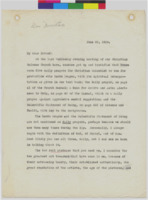
Correspondence between Gertrude Bass Warner and General Normann Munthe
Transcript:
Gen Munthe
June 29, 1929.
My dear friend:
At the last Wednesday evening meeting of our Christian Science Church here, someone got up and testified that there were five daily prayers for Christian Scientist to use for protection—the Lords Prayer [sic], with its spiritual interpretation as given in our text book; the Daily prayer, on page 41 of the Church Manual; A Rule for Motive and Acts; Alertness to Duty, on page 42 of the Manual, which is a daily prayer against aggressive mental suggestion; and the Scientific Statement of Being, on page 468 of Science and Health, with key to the Scriptures.
The Lords Prayer and the Scientific Statement of Being are not mentioned as daily prayers, perhaps because we should use them many times during the day. Personally, I always begin with the definition of God, of Christ, and of Man. Most likely you use all these, daily, but I can see no harm in talking about it.
The two roll pictures that you sent me, I consider the two greatest art treasures that have come to me, because of their entrancing beauty, their established authenticity, the great reputation of the artists, the age of the pictures, and their practically perfect condition. It may be that I will be generous enough to give them to the museum -up to now it has now come to me to do it. I can’t begin to tell you how grateful I am to you for sending them to me.
At the time of the Commencement here, June 8th to 10th Mrs. Potter and I got out of the University vault the last treasures you sent me, -the jade, the crystal, the rose quarts, the apple-green porcelaine [sic] and the two peachblow vases- for the public to enjoy during the graduating festivities.
Already you have pricked up your ears at the mention of the peachblow. To my utter amazement I lifted them out of one of the little barrels. There they were in perfect condition, safely stored away all this time in the University vault, and not one of us knew it. Of course, I greatly rejoice over this discovery and I also realize that you will have a good laugh at my expense -So be it! Of course, I supposed I had opened every one of those barrels and boxes and how I could have passed that one by, and how we could all passed it by, is beyand [sic] my understanding. Anyway, it is now, not only safely housed as it was before in the Administration vault, but also in our hearts as two of the children of the museum.
Now I am going to tell you something that will take you back to the time of the first recognition of your public service.
I was in New York expecting to be in the East for the Summer, when I received an invitation from President Hall to return to the University to receive an honorary degree of Master of Arts in Public Service to be conferred during the Commencement exercises. Of course I came. The loving expression of gratitude gave me great joy.
Who was the first friend to extend a helping hand to this stranger, when my work began? My gratitude to you, was within my heart and consciousness on that Commencement Day!
End of transcript.
Transcribed by Tom Fischer.
-
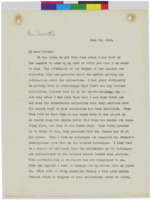
Correspondence between Gertrude Bass Warner and General Normann Munthe
Transcript:
Gen Munthe
June 29, 1929.
My dear Friend:
It has taken me all this time since I was last in Los Angeles to make up up my mind to write you what I am about to say. The attendants at the museum at Los Angeles are evidently very antagonistic about the public getting any information about the collection. I had great difficulty in getting them to acknowledge that there was any further collection, besides what is in the up-stairs room. It was only after I had told them that I had been there and had seen the down-stairs collection that they admitted that the second half of your collection had been exhibited. Then they told me when it was taken down it was placed in an inside room for a while until that room was needed for something else, and the it was taken away. Upon being pressed as to where it was, they presumed that Mr. Furman had it at his place. Then I took my catalogue and compared Mr. Furman’s decsriptions with that in the printed catalogue. I find that in a number of instances that the statements in the catalogue are contradicted in the notices placed beside each picture. This contradiction of statement was not discovered by me. From Los Angeles I went to Chicago and my mother told me about it. That sort of thing makes Mr. Furman a very poor medium through which to dispose of your collection; added to which, I do not believe that he has had any opportunity to make a scholarly study of Chinese Painting or to make himself an authority. It seemed to me that he was trying to “show off” and we all know that “a little knowledge is a dangerous thing.” When he began to question the authenticity of the paintings, or the authernticity of the catalogue he was doing something which would, in my opinion, undermine the value, authenticity and desirability of the collection—a thing he had no right to do, in my opinion.
Because I thought that this would disturb you, and because I could not see what you could do at that distance to protect yourself, I have waited all this time before telling you—but I have to the conclusion that I have no right to keep it from you. I am sending you the catalogue with the annotations that I made in it.
The truth is that God’s Creation is perfect and is the manifestation of perfect honesty and there is no dishonesty in man, his highest creation. There is but the one Mind, perfect and eternal, expressing perfect honesty, and this fact held to will bring harmonous [sic] results which neither time or distance can dispel.
End of transcript.
Transcribed by Tom Fischer.
-
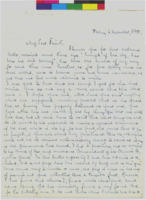
Correspondence between Gertrude Bass Warner and General Normann Munthe
Transcript:
Lite copied
Peking, 6 December, 1928.
My Dear Friend,
Thank you for your welcome letter received some time ago. “Enough of the day has been the evil thereof,” has been the burden of my song for some time now. Matters, so far from getting more and more settled, seem to become more and more un-settled and one does not feel much inclined to write.
I was glad to hear that the things I got for you had arrived. You do not say a word about how you liked them—I hope you did. Nor have you said anything about the supposed missing parcel that we had traced here as having been properly delivered at your end. You have still here the mate of the big Kang-Hsi blue-and-white fish vase (C-359 a-360//), but it will have to wait till other things are sent, as it would be too expensive to make a special shipment of the vase, which is too big for the post and would have to go as freight./
/You ask about my position, etc. When the old regime went out all the [] automatically ceased to exist as it were as the government here ceased. I had 2 positions, one as adviser to the Board of War, and another as Commandant of the Chinese Legation Guard. In this latter capacity I have been retained as adviser, but as all pays have been reduced by half, and as these [] comes around every two months or more, the pay is more in the way of promise and good intentions than a tangible fact. However, I have found that I, from a mortal stand-point, could see no opening, God has invariably found a way for me. But for his protecting arm, I do not know where I should have been at at times. Mortal mind would perhaps be inclined to explain it all as coincidences, but it is no such thing. I can see God’s hand in it all, and no other explanation is possible. This feeling gives me great happiness and contentment of mind. I know that come what may, He is there with His omnipotent Love, and will see me through. I had been in hopes of being able to come to America this year that is now drawing to a close, but apparently it has not worked out that way, and my visit, I now hope, may materialize in 1929. I cannot start from here till I have a settlement of my collection in American and what I have here now. The option is up on April 1st. There are no difficulties as far as the collection is concerned, all agree to buy, but there are apparently some difficulties as regards Mr. Furman. Whether they think he is making too much for himself or not, I cannot say. I have had offers from other to dispose of the collection, but in fairness to Mr. Furman I have declined to entertain any proposals till his time-limit—April 1st—is up. If nothing has transpired before then, we shall then see what will be the best course to take. I do not worry. I have left the whole matter in God’s hand. He knows what my intentions are, and I pray that He will find me worthy to do His will, whatever form it takes. This letter will reach you about New Year, may it bring you my most sincere, loving thoughts and wishes to you and for you and for all near and dear to your heart. My grateful thanks for every kind though, word or deed in the past year, and above all a grateful heart to God who has given me your friendship.
Ever your friend,
Normann Munthe.
End of transcript.
Transcribed by Tom Fischer.
-
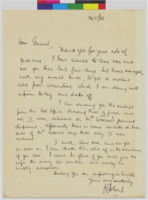
Correspondence between J. C. Albert and General Normann Munthe
Transcript:
16/5/28
Dear General
Thank you for your note of yesterday. I have wanted to come over and see these last few days but have managed, with my usual luck, to get a violent cold from somewhere which I am dosing with aspirin to lay and shake off.
I am sending you the receipt from the Post Office showing that 16 parcels and not 15 were delivered on Ms. Warner’s previous shipment. Apparently there is some mistake on the side of Ms. Warner’s ship that only 15 were received.
I will come over and see you as soon as I can shake this cold off, in the meantime, if you care, I would be glad if you could give the wife the money you mention—will surely be mighty acceptable.
Trusting you are improving in health
Your very sincerely
J. E. Albert
End of transcript.
Transcribed by Tom Fischer.
-
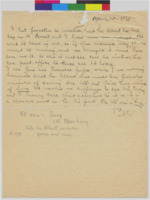
Correspondence between Gertrude Bass Warner and General Normann Munthe
Transcript:
April 24-1928
I had forgotten to mention that Mr. Albert has had box no. 16 traced and I have seen the receipt. He send 16 boxes in all, so if you received only 15, one must be moving and we thought it would have been no. 16. As this is not the case, he requested the post-office to trace all 16 boxes.
I see from the C[] paper, which I am enclosing herewith that Mr. Albert has made the technical mistake of calling the Ke-Ssu Chien Lung instead of Sung. It makes no difference to the []. Curious, and I merely call your attention to it as it is a clerical error on Mr. A’s part. The Ke ssu is Sung.
M. N. C.
Ke ssu- Sung
NOT Chien Lung
Note see Albert invoice
C-178 geese and reed-
End of transcript.
Transcribed by Tom Fischer.
























